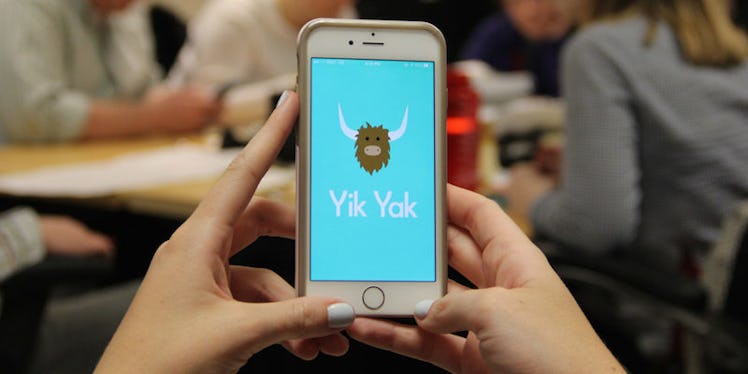
Why You Can't Blame The Yik Yak App For Cases Of Cyberbullying
At face value, you may find a lot of incessant insults.
Everyone seems bitter, profusely lonely or disgustingly desperate for sex.
There's the classic and cryptic “DTF!?” or the ever-popular, “Who's down to blaze?”
But upon methodical inspection of your Yik Yak newsfeed, gems may be found. Take, for instance, a Yak posted May 21. An anonymous user posted the following:
"Just came out to my mother that I'm lesbian. Did not go well. Looks like I have to move back to College Park over the summer. Hooray."
What ensued was not ridicule and harsh words, but rather support and comfort. Users responded with apologies and healing wishes.
Take another example concerning a terrible breakup. The user posted,
“5 years of being with someone, and then not … kind of makes you lose yourself. I feel like I've lost my personality and idk who I am anymore.”
Various users positively responded, including this uplifting feedback:
"I'm really sorry though but I think you should be happy to have been with someone so long and learned so much now. It's time to move on [with] the next thing in your life. It's time to focus on yourself."
This positive reinforcement and promotion of independent self-discovery seems more tailored toward what Yik Yak founders Brooks Buffington and Tyler Droll originally intended.
The founders said, in a March 2014 International Business Times UK article, the app was meant to act as a "nonjudgmental, real-time bulletin board.”
The app is supposed to act as a valuable and resourceful outlet of information, in addition to creating a sense of collective discussion and ideas, Buffington told the IBTimes UK. He says:
"We wanted to enable people to be really connected with the people around you, even if you don't know them. "It's like a virtual bulletin board, a hyper-local version of Twitter where people can use it to post information and everyone in the area can see it."
The Furman University graduates' app has captured the attention of more than 200,000 users.
Yik Yak allows up to 500 users in a geographical location to post anonymously in a traditional social media form.
And, although a warning of mature content is featured upon first entrance, the app still received negative press late last year.
Select parents, scholastic officials and even users themselves expressed various concerns regarding incidents of cyberbullying, sexually explicit commentary, hate speech (by the way, “hateful ideas,” as clarified by legal scholar Eugene Volokh, are protected under the First Amendment) and other forms of harassment.
A bomb threat posted on the app caused a campus lockdown at San Clemente High School in California, according to an LA Times article from March 6, 2014.
Authorities said anonymous postings make it difficult to find validity in threats of such nature.
Honestly, it all comes down to the person behind the posting. Although it's anonymous, words can still hurt.
And safety is obviously imperative, so threats of all forms should not be treated with a devil-may-care attitude.
But, there is a “flag” button for a reason, and even though it's not exactly clear what occurs in terms of discipline, it shows that the founders believe in some sense of ethical conduct.
As long as no names are used and the nature of the post is strictly ominous (as originally intended), Yik Yak really doesn't seem so awful.
It can be quite useful, actually, for finding job postings, asking for a quick opinion or simply making a new Snapchat friend. (Yes, this actually happened to me.)
In addition, the founders said the app's supposed domination of cyberbullying or high schoolers is a misconception.
"In reality, 95 percent of Yik Yak users are college students with 'very little' cyberbullying and threats," Droll and Buffington said in a March 16 TechCrunch article.
So maybe it's just a matter of location, location, location, as opposed to dominating "cyberbullying trolls."
The raw and unabashed environment the app creates can positively encourage users to be brutally honest or express a deep and meaningful hindrance they wouldn't normally in a face-to-face interaction.
This doesn't mean instances of rape jokes or vigorous bullying should be acceptable.
But, freedom of expression in America, within reason (I won't give a lesson in law), exists for a purpose. It should be clear, however, not every aspect of “expression” is protected.
Yik Yak's founders have said in various press appearances they are working to provide app restrictions for users under the age of 17, which would provide a legitimate firewall seeing as in most states, the age of appropriate “majority” is 18.
Look, it's difficult to control users in the thousands. And depending on the type of phone model, whether Android or Apple, if you're a concerned parent (and I commend you for being one) there are security options readily available.
That is, if you're feeling wary about the apps your potential 10- or 13-year-old may be experimenting with.
After all, according to a 2012 National Consumer League study, nearly 60 percent of parents said they offered cell phones to their children at ages 10 or 11.
For now, ignore, “flag” or “block” the run-of-the-mill “thirsty” booty calls and unnecessary insults.
Look for words of advice, positive reinforcement and the sometimes stellar Netflix suggestions.